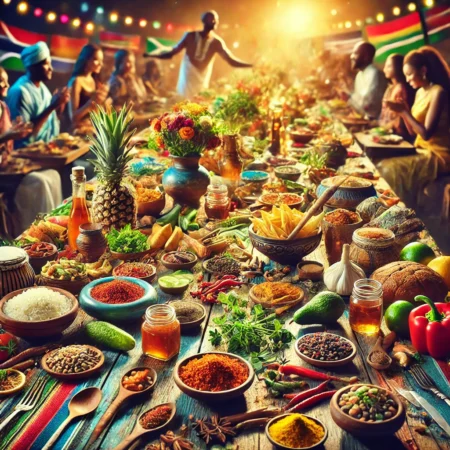African cuisine is a vibrant and diverse celebration of flavors, deeply rooted in history, culture, and tradition. From the bustling markets of Nigeria to the spice-rich kitchens of Morocco, every dish tells a story of community, heritage, and ingenuity. With influences from indigenous ingredients, colonial trade, and regional techniques, African food is an exciting fusion that continues to captivate food lovers worldwide.
A Rich Culinary Heritage

Africa’s culinary landscape is as vast as the continent itself. With over 50 countries, each region boasts its own unique flavors and cooking styles. The North African cuisine, influenced by Arab, Berber, and Mediterranean cultures, features dishes like couscous, tagines, and harissa-spiced meats. In West Africa, bold flavors dominate with dishes like Jollof Rice, Suya, and Egusi Soup. Moving to Central Africa, stews and sauces made with peanuts, cassava, and plantains take center stage. East African cuisine, influenced by Indian and Middle Eastern spices, includes delicacies like Nyama Choma, Ugali, and Chapati. Finally, Southern Africa is known for its grilled meats (Braai), Bobotie, and pap served with rich, hearty sauces.
The Power of Indigenous Ingredients
One of the defining aspects of African cuisine is the use of fresh, natural, and locally sourced ingredients. Staples such as millet, sorghum, yams, cassava, maize, and plantains form the foundation of many meals. Spices like cumin, coriander, ginger, and chili add depth, while nuts, seeds, and leafy greens enhance flavor and nutrition. The use of smoked fish, dried meats, and fermented foods like garri and kenkey also contribute to the distinct taste of African cooking.
A Blend of Culinary Influences
The influence of colonial trade, migration, and globalization has added layers of complexity to African cuisine. European, Middle Eastern, and Asian flavors have merged with traditional African dishes to create exciting fusions. For example, Senegal’s Thieboudienne, a dish of rice and fish, has French and Portuguese influences, while Zanzibar’s cuisine incorporates Indian and Arabic spices due to its historical spice trade.
Celebrating African Street Food
African street food culture is a vibrant reflection of the continent’s love for bold, accessible, and satisfying flavors. Whether it’s Moi Moi (bean pudding) in Nigeria, Bunny Chow in South Africa, or Kelewele (spicy fried plantains) in Ghana, street food showcases the ingenuity of African cooking. These portable delights bring people together, offering a shared experience of authentic flavors.
The Social and Cultural Significance of African Cuisine
Food in Africa is more than just sustenance—it’s a way of life. Meals are a communal experience, often shared with family, friends, and guests. Special occasions like weddings, festivals, and naming ceremonies feature grand feasts, where traditional dishes are prepared with love and passed down through generations. Cooking is an act of storytelling, carrying the wisdom, history, and spirit of ancestors.
African Cuisine in the Global Food Scene
With the growing appreciation for bold, wholesome flavors, African cuisine is gaining recognition on the global stage. Restaurants, food festivals, and celebrity chefs are bringing African dishes to the forefront, introducing the world to the continent’s rich flavors. From fusion Afro-Caribbean restaurants in London to Nigerian Jollof pop-ups in New York, African food is making waves in the culinary world.
Bringing African Flavors to Your Kitchen
Embracing African cuisine at home is a journey worth taking. Start by experimenting with key ingredients like palm oil, plantains, peanut sauce, and suya spice mix. Try cooking a hearty Ndolé from Cameroon, Injera from Ethiopia, or Bobotie from South Africa. Pair dishes with refreshing drinks like Hibiscus tea (Bissap) or Ginger beer to complete the experience.
Conclusion: A Celebration of Africa’s Culinary Identity
African cuisine is a testament to the continent’s rich cultural diversity, resilience, and creativity. It is a fusion of flavors, history, and tradition, offering an exciting and immersive experience for food enthusiasts around the world. Whether you’re savoring a spicy stew, enjoying grilled meats, or indulging in sweet fried dough, every bite of African food is a taste of heritage and unity.
Ready to explore African cuisine? Let us know your favorite dish in the comments!

There are no comments